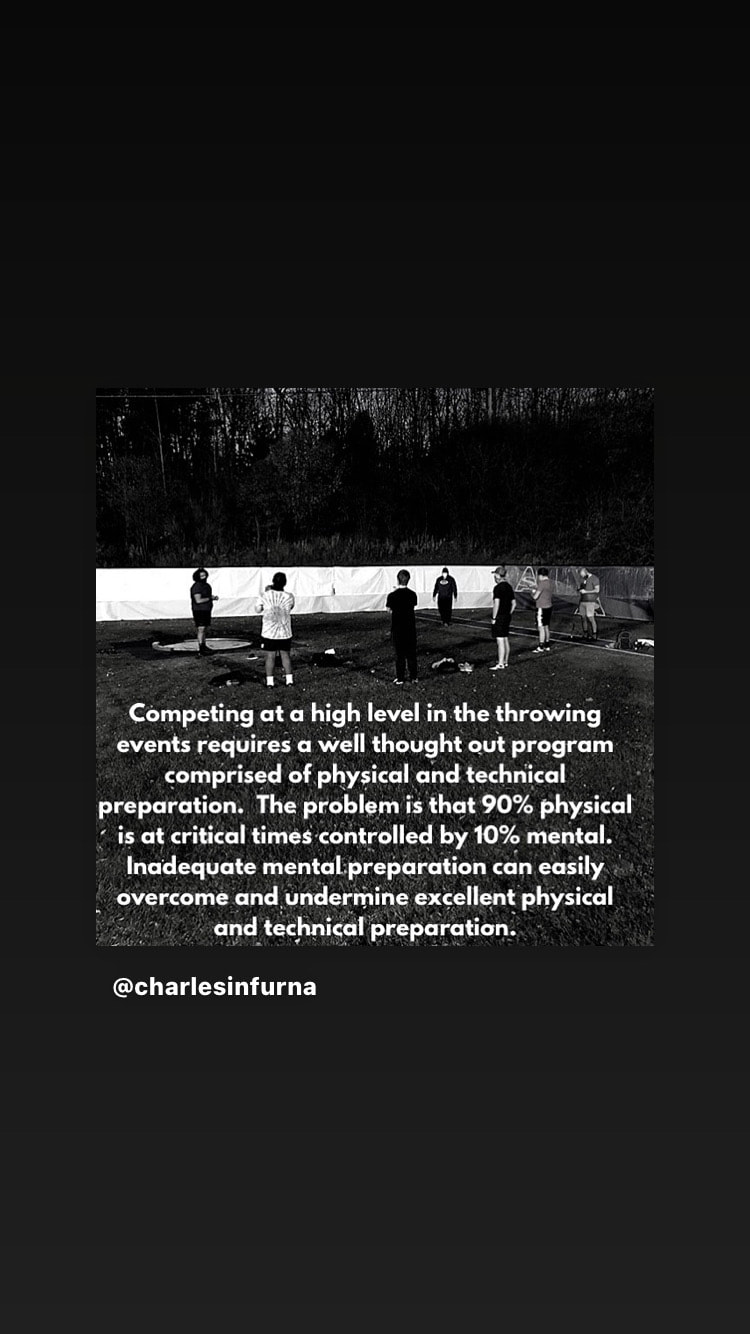|
The other day I wrote about how we structure our practice times at Alfred State to maximize the time I have with the athletes. We are limited on the number of practice sessions we can have per week (2), and guidelines restrict our practice length to one hour. Where in the past I would spend two hours training and coaching my athletes at Fredonia or Nazareth per session, now that is the maximum amount of time we have for a week. That is still more practice time than some schools across our area that have sent their students home for the remainder of the semester.
So what do we focus on? Well, much like physical skills that can be taught, such as proper technique in the throwing events, focus is a mental skill that can be taught as well. When I share ideas with my athletes about focus, we don’t sit down in a room and have what you might consider a coaches talk for an hour on the subject. I am subtle with my conversations because I am still getting to know this group of throwers and they are still getting to know me. And also because this group consists of all freshmen throwers, I don’t want to overload them with too much information during a one hour training session. I’ve briefly written about it before, but focus is a complex skill comprised of five different mental components (McGuire, 2012; 2016):
Over the past few years, I have found that concentration has been the easiest component for me to teach my throwers. I equate concentration to cuing in the circle or on the runway. When I first began coaching, I would give kids half a dozen different things to concentrate on per throw. That was not very helpful. It wasn’t helpful to the thrower and it wasn’t helping me because we would both grow frustrated when something didn’t go well. Now, I usually give my kids one or two cues after they complete their throw to think about for the next one. It is a struggle at times because if that cue goes well then something else may not go well. In my experiences, working on one or two cues a session or week assists in instilling confidence and mastery because the athletes, over time, will begin to master that specific component of their throw, so then we can move onto the next one we need to concentrate on. The most difficult component I have difficulty with is the first one, being in the present moment. I have noticed that for some athletes, it is not easy for them to turn off their academic brain and turn on their athletic brain in an instant. An athlete coming from class may have a difficult time making the initial switch. I try to give them a few minutes to gather themselves after their class before we get started. I always ask them how their day is going and how class went. That is a way to take the temperature of the group and figure out where their minds are. If they had a rough class, I know that I need to adapt my coaching style for the day to meet their needs. If they had a pretty good day, then it is probably an indication that we can continue as scheduled. All too often I’ve attended high school track and field meets and I can hear coaches screaming at their kids to focus on what they are doing. Well, if they haven’t been taught that skill, how would you (as a coach) expect them to be able to execute on it? I wouldn’t ask a thrower to take a toe and three in the hammer during a meet if they have never practiced that skill during a training session. So why would you expect high mental strength capacities from your athletes if you’ve never trained them on those specific skill sets before?
0 Comments
Leave a Reply. |
Dr. Charles InfurnaCharles Infurna, Ed.D., is the owner and lead coach of Forza Athletics Track Club. Dr. Infurna has coached National Record Holders, National Champions, All-Americans, and Conference Champions at the Post-Collegiate, Collegiate, and High School level. Archives
January 2023
Categories |


 RSS Feed
RSS Feed